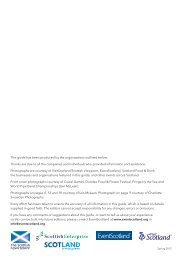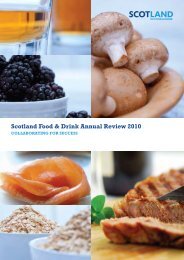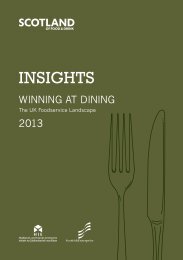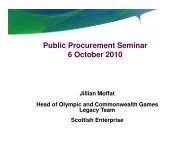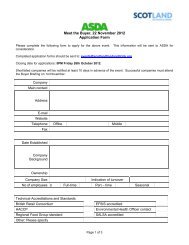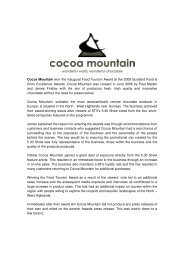How do I: Select a Market Research Agency? - Scotland Food and ...
How do I: Select a Market Research Agency? - Scotland Food and ...
How do I: Select a Market Research Agency? - Scotland Food and ...
You also want an ePaper? Increase the reach of your titles
YUMPU automatically turns print PDFs into web optimized ePapers that Google loves.
<strong>How</strong> <strong>do</strong> I: <strong>Select</strong> a <strong>Market</strong> <strong>Research</strong> <strong>Agency</strong>?Need to conduct <strong>Market</strong> <strong>Research</strong> <strong>and</strong> think you need specialist help? This guide will help youquickly underst<strong>and</strong> the task, its key elements <strong>and</strong> how to progress.Fresh, focused <strong>and</strong> unique consumer data is dynamite to a business. Properly applied it can ignite manymarket opportunities. But, poorly interpreted, it can seriously damage your business strategy. Extracting<strong>and</strong> interpreting consumer <strong>and</strong> market information on a significant scale is a very specialist skill.<strong>Select</strong>ing a <strong>Market</strong> <strong>Research</strong> agency that will work for you is the first step to securing valuable informationthat can be effectively used within your business.BUSINESS BENEFITSUsing a <strong>Market</strong> <strong>Research</strong> agency gives you a number of business benefits, including:• Greater objectivity to a project with no knowledge, or interest, in company politics.• Specialist skills to extract the information you need.• Specialist resources e.g. call centres or field operators.• Company anonymity which may aid the objectivity of response.In addition, the tendering process will allow you to learn from a number of different responses <strong>and</strong>benchmark elements like process, cost <strong>and</strong> timing.GETTING STARTEDStart with the brief. Writing the research brief allows you to gather <strong>and</strong> test your thoughts on theresearch project. Ask yourself, <strong>and</strong> other relevant people in the business, some key questions:• What information <strong>do</strong> I need? Be specific about what you need to know <strong>and</strong> why. Checkwhat information already exists within the business e.g. in another department ordivision.• What is the value of the information? Decide how this information could add value to thebusiness e.g. could it help develop a new product or gain new distribution.• <strong>How</strong> will the information be used? <strong>Market</strong> <strong>Research</strong> will be part of the marketing plan. Itshould be conducted as part of an overall activity programme e.g. new packaging orproduct development. It is important to plan how the results may impact on the overallproject to ensure the correct information is being sought at the outset.The research brief will form the initial project specification to which your appointed agency will work. Itshould, therefore, contain all key information to achieve an effective result. As a guide, the followingshould be included:• Background on your company.• The opportunity or issue to be explored – what information is needed, why, what will itbe used for? The questions you answered above will form the basis for this section.• The objectives of the research.• Target audience – a description of those people whose views are most important to theresearch findings.• <strong>Research</strong> deliverables – exactly what <strong>do</strong> you expect the agency to deliver e.g. adviceonly, a full report, data collection, recommendations, etc.• Timescales.• Budget – you may not want to specify an exact budget at this initial stage if, forexample, further input is required from the research agency on the final research modelor the brief is subject to a competitive tender.
Type of <strong>Research</strong>. There are many different types of <strong>Research</strong> agency (see below). Rather than brief anumber of full-service agencies, it is often more efficient to decide what type of research you may need<strong>and</strong> brief agencies which particularly work in that area. To help you decide what research type is best foryour needs see the <strong>How</strong> <strong>do</strong> I: Conduct <strong>Market</strong> <strong>Research</strong>? guide which contains a comprehensivesummary of different types of research metho<strong>do</strong>logy.Short-listing. Next step is to shortlist three or four agencies to which you can issue your brief. If you areunaware of specialist suppliers talk to your business advisers, fellow food <strong>and</strong> drink companies,customers, etc. <strong>Scotl<strong>and</strong></strong>food<strong>and</strong>drink.org also has an online database of UK consultants, brokers <strong>and</strong>agencies.RESEARCH AGENCIESThere are a number of different types of research agency, each suitable for different research <strong>and</strong> clientrequirements. Generally they fall into five categories:Full Service: these tend to be large organisations which are capable of h<strong>and</strong>ling most types of researchproject. From briefing stage, these agencies will manage all aspects of the project <strong>and</strong> have the facilitiesto implement different types of research in-house. Benefits of this type of agency include clearprocedures, account management, experience in many sectors <strong>and</strong> good general consumer <strong>and</strong> markettrend information. These agencies are particularly good for large quantitative studies. <strong>How</strong>ever, it is worthgetting comparable quotes, as costs can be high for this type of work.Qualitative/Quantitative: many agencies are defined by the general type of research they offer i.e.either qualitative or quantitative. Qualitative agencies will generally cover most techniques required toextract <strong>and</strong> explore consumer views, reactions <strong>and</strong> beliefs on a subject. Quantitative agencies will usetechniques to extract <strong>and</strong> analyse the hard numbers which explore a particular area. These agencies willvary in size <strong>and</strong> may sub-contract elements of the work they cannot <strong>do</strong> in-house.Fieldwork: these agencies will deploy personnel in-market to extract quantitative results e.g.questionnaires in the street or mystery-shopping. These agencies will generally deliver their results to theclient without further analysis or interpretation.Data processing: these agencies will purely process the information you supply to them. This may beinformation generated by e.g. a fieldwork agency or in response to a promotion.Specialist: these agencies will have specialist experience in particular areas of research (e.g. advertising,corporate, international, etc.), markets (retail, foodservice, online selling, etc.) <strong>and</strong>/or sectors (agriculturalproducts, fish & seafood, prepared foods, etc.) The advantage of a specialist agency is that they willhave a deep knowledge of their field <strong>and</strong> can often add value to your research project.Tender or not? If your company has no prior agency experience then tendering can be a very efficientway of quickly starting a project. If new to a particular area of market research it is also an informativeprocess, which allows you to benchmark responses to help inform your judgement. In addition, costs willvary depending on the research objectives <strong>and</strong> metho<strong>do</strong>logy <strong>and</strong> tendering can help you underst<strong>and</strong> <strong>and</strong>compare costs. <strong>How</strong>ever, for agencies, it can be a time consuming <strong>and</strong> costly experience. Therefore acertain degree of prudency should be exercised e.g. tenders should be limited to three or four agencies<strong>and</strong>, where possible, limited to an outline approach, timing plan, budget <strong>and</strong> agency credentials.SELECTION CRITERIADrawing up your agency short-list will be based on experience – both theirs <strong>and</strong> yours. Use a set ofselection criteria to help direct your judgement at this stage. The important criteria include:• Sector experience: has the agency worked in the relevant sector before <strong>and</strong> so c<strong>and</strong>emonstrate underst<strong>and</strong>ing <strong>and</strong> bring up-to-date knowledge to the project?• Technical experience: is the agency experienced in the particular type of research yourequire e.g. focus group or telephone survey?• Personal experience: have you worked with the agency before <strong>and</strong> had positiveexperience of them?• Recommendation: the agency may have been recommended by a colleague or haveworked with the business before. Positive recommendation from someone you know canbe useful input to a project.• Resource: consideration may need to be given to the resources of an agency e.g. <strong>do</strong>they have international capacity.
RESEARCH PROPOSALYour brief should determine the response timing. As a general rule, you should allow at least two weeksfor agencies to prepare proposals.The proposal serves as a quote from the agency <strong>and</strong> is the basis for the future contract. The proposalshould contain all the important elements of the project <strong>and</strong> should provide a clear underst<strong>and</strong>ing of howthe project will be completed. The main elements which should be included are:• Confirmation of what type of research should take place <strong>and</strong> the process that will bea<strong>do</strong>pted. While your original brief may have given direction on research metho<strong>do</strong>logy(e.g. qualitative not quantitative), it is the role of the agency to exp<strong>and</strong> on the detail ofthe research metho<strong>do</strong>logy <strong>and</strong> explain their reasoning for their recommendations.• A detailed outline of the research process (including the target audience the researchwill use), the number of target responses the research will aim to evaluate <strong>and</strong> thegeographical spread of the research.• Demonstration of experience, knowledge <strong>and</strong> resource relevant to the project.• Confirmation of deliverables.• A detailed timing plan to cover each stage of the project.• A full break<strong>do</strong>wn of costs, including fees, anticipated expenses <strong>and</strong> Vat (as appropriate).• Background details on the proposed project team, including the project manager <strong>and</strong>key researchers.The tendering process allows you to review <strong>and</strong> compare the different responses.ROLE OF THE AGENCYThe agency proposal should form the basis for the project contract so ensure you are fully satisfied withthe selected agency’s response before formally appointing them.It is worth having a formal “start-up” meeting with the chosen agency to discuss all the elements of theproject <strong>and</strong> ensure the agency is clear about what is expected of them. At this stage too, levels of clientinvolvement can be agreed e.g. <strong>do</strong> you want to sit in on some of the group discussions if it is qualitativeresearch; or, <strong>do</strong> you want the agency to fully manage the project <strong>and</strong> just report back to you with results<strong>and</strong> recommendations?You should agree various review <strong>and</strong> reporting stages. The frequency <strong>and</strong> format of these will depend onthe type <strong>and</strong> size of research project being undertaken: however, even if you just settle for weeklytelephone conversations, it is crucial that you are kept up to date with progress. A good relationship withyour agency will help to ensure a quality end result <strong>and</strong> best value for money.Most clients also ask to approve all questionnaires, interview schedules, discussion guides, etc. before theagency begins their contact programme. This is particularly important if the agency is going to be namingyour company when they contact target businesses or consumers.On completion of the research, the agency should provide you with a comprehensive report on thefindings <strong>and</strong>/or arrange a meeting to present the results. The findings should be reported in a way thatclearly addresses the research objectives <strong>and</strong> explores all the areas agreed at the outset. You should alsobe given the opportunity to ask questions about the research, or raise any concerns.At the end of the research project, an internal review meeting may be held to discuss the project process,problems <strong>and</strong> anything that might be <strong>do</strong>ne differently next time. An evaluation of performance may alsobe given to the agency. Keep this on file within your company for future reference. For more informationon this area see the <strong>How</strong> <strong>do</strong> I: Conduct <strong>Market</strong> <strong>Research</strong>? guide.
HOW DO I? SUMMARY1. Write the research brief <strong>and</strong> secure internal approval to proceed.2. Using your agreed selection criteria, select a short-list of three or four agencies to tender.3. Allow at least two weeks for response, <strong>and</strong> then review research proposals.4. Use the start-up meeting to agree expectations, client involvement <strong>and</strong> key elements of the project.5. <strong>Agency</strong> presents project results <strong>and</strong> recommendations.6. Project review <strong>and</strong> evaluation.OTHER SOURCES OF INFORMATION:Visit www.scotl<strong>and</strong>food<strong>and</strong>drink.org−−INSIGHTS: you can access data on geographic markets, consumers, retailers, foodserviceoperators, specific product sectors <strong>and</strong> moreThere are many other <strong>How</strong> Do I? Guides which can help you grow your businesswww.scotl<strong>and</strong>food<strong>and</strong>drink.org - The information service tailored to the food <strong>and</strong> drink industry.Contact the <strong>Scotl<strong>and</strong></strong> <strong>Food</strong> & Drink Helpline on 0845 601 3752.


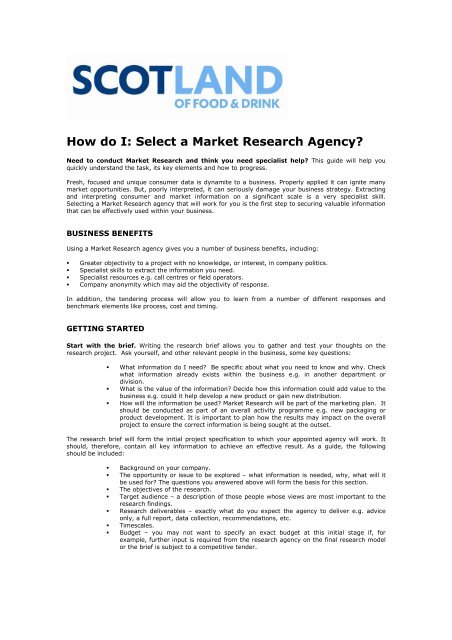



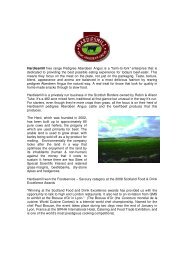

![SAOS presentation [Compatibility Mode] - Scotland Food and Drink](https://img.yumpu.com/47771964/1/190x146/saos-presentation-compatibility-mode-scotland-food-and-drink.jpg?quality=85)
